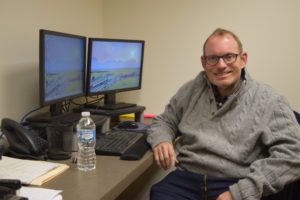As stay-at-home orders began in the middle of March, it was challenging to transition to a life at home. We had routines school, work, social activities and those routines were uprooted in an instant. For many of the people the St. Louis Arc supports, a routine is extremely important. As everyone struggled to find their new normal, the Arc worked quickly to find ways to continue to provide the services that were central to many individuals routines.
The Arc supports many teens and adults in identifying and navigating goals to independence. From finding and maintaining a job to strengthening socialization skills, the Arcs Supported Employment, Launch, and Connect teams work with individuals to learn essential life skills. Transitioning supports that require face-to-face interaction to a virtual support model was no small task. How do you teach someone the importance of social interaction when they cant leave their home? Can you provide on-the-job training when a job coach isnt allowed to be at a job site? The staff worked quickly and successfully to keep these individuals working toward their goals and maintain aspects of their routines.
Supported Employment
During the first few months of the pandemic, 48% of individuals in the Supported Employment program had jobs deemed essential and continued to go to work. For those who were not essential employees, they have been unable to work due to layoffs or are furloughed until the pandemic is over.Supported Employment staff continue to do virtual safety and wellness checks, offer social skills activities, and are finding new ways to build upon an individuals job skills. One adaptation has been to set up weekly chore schedules for people who are staying home. These schedules allow individuals to work in the home, providing an opportunity for the individual and employment staff to maintain work skills while also engaging with the individual. Group classes have focused on interviewing, problem-solving, and communication.
Life Skills
The Launch program has continued providing both group and one-on-one virtual supports. Hands-on virtual classes are continuing to teach valuable life skills such as cooking and laundry. For one individual who identified a goal of staying active, their one-on-one meetings are now done on the phone while taking a walk outside.
For individuals who have transitioned to living independently, losing in-person support can be difficult. The Connect team increased the frequency of communication with these individuals to a daily phone call or virtual visit to ease the levels of anxiety. The team has also concentrated on emotional intelligence, focusing on recognizing and labeling emotions while staying at home.
Socialization
Across all of the programs, the teams are focusing on socialization skills. It is not surprising that during the pandemic people feel isolated. For individuals who have been working for months to improve their socialization skills, it is vital for them to continue to practice and develop those skills. Not only do we want individuals to maintain the skills theyve learned, but want to keep their spirits up and improve overall morale. Meetups are offered with classes such as Zumba, yoga, and photography. Social Meetups and group meetings have included scavenger hunts and trivia nights.
As we move forward the Arc will continue to provide quality supports to people with disabilities virtually until it is safe to do so in-person. If you are interested in learning more about these programs please reach out via email to Supported Employment, Launch, or Connect.
